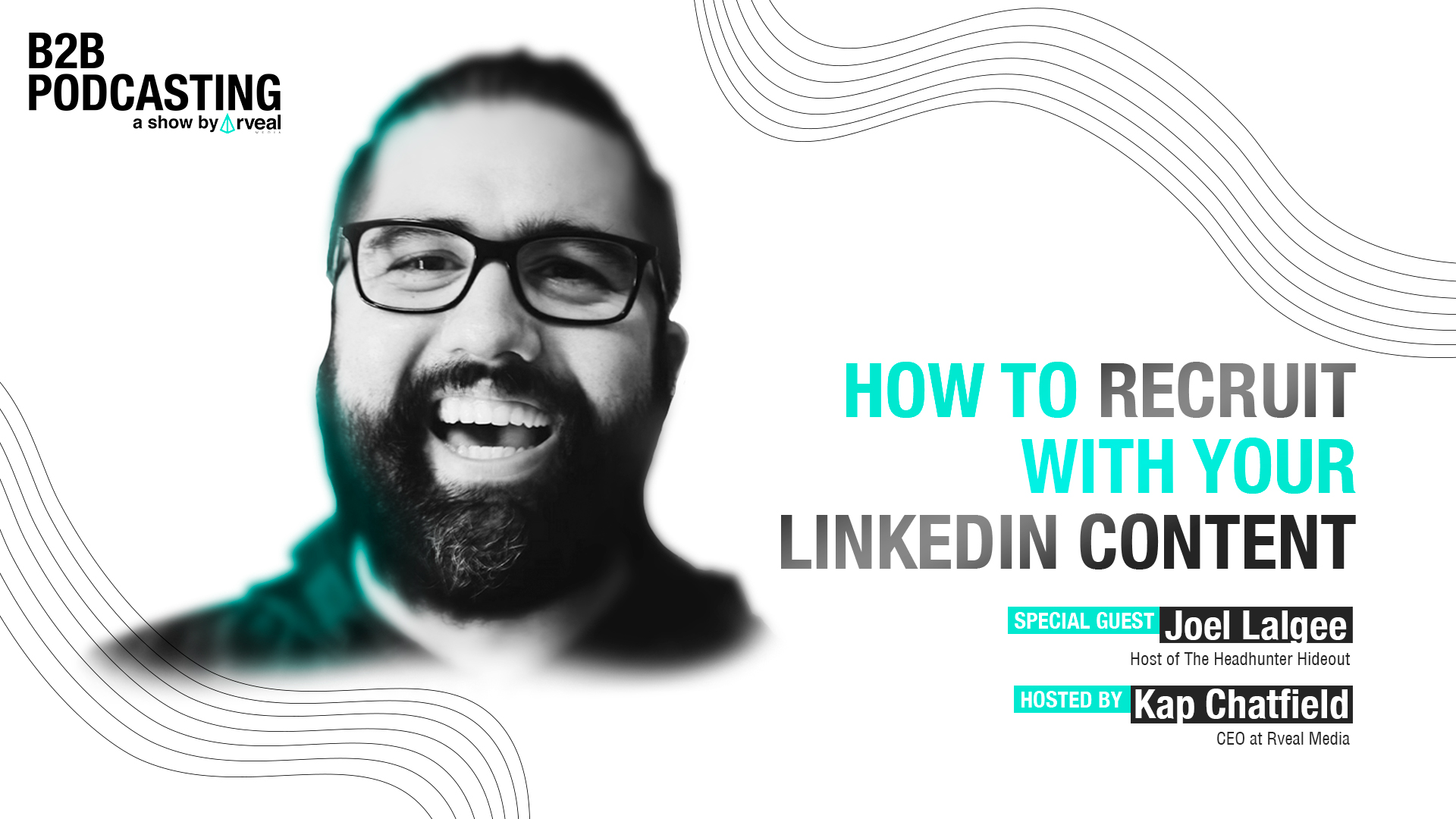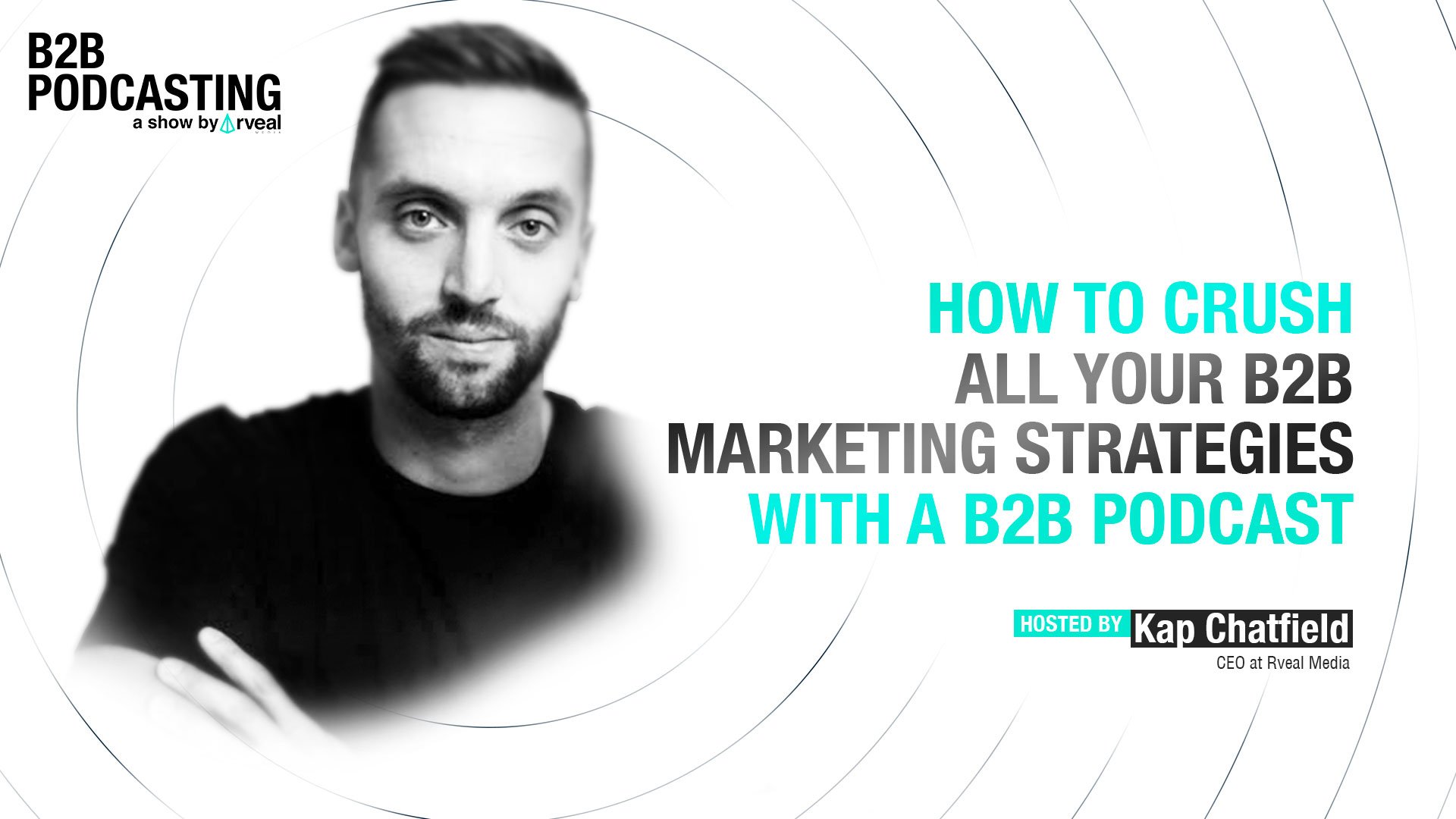Disrupting the Wealth Management Industry with a Show - with Larry Sprung, CFP
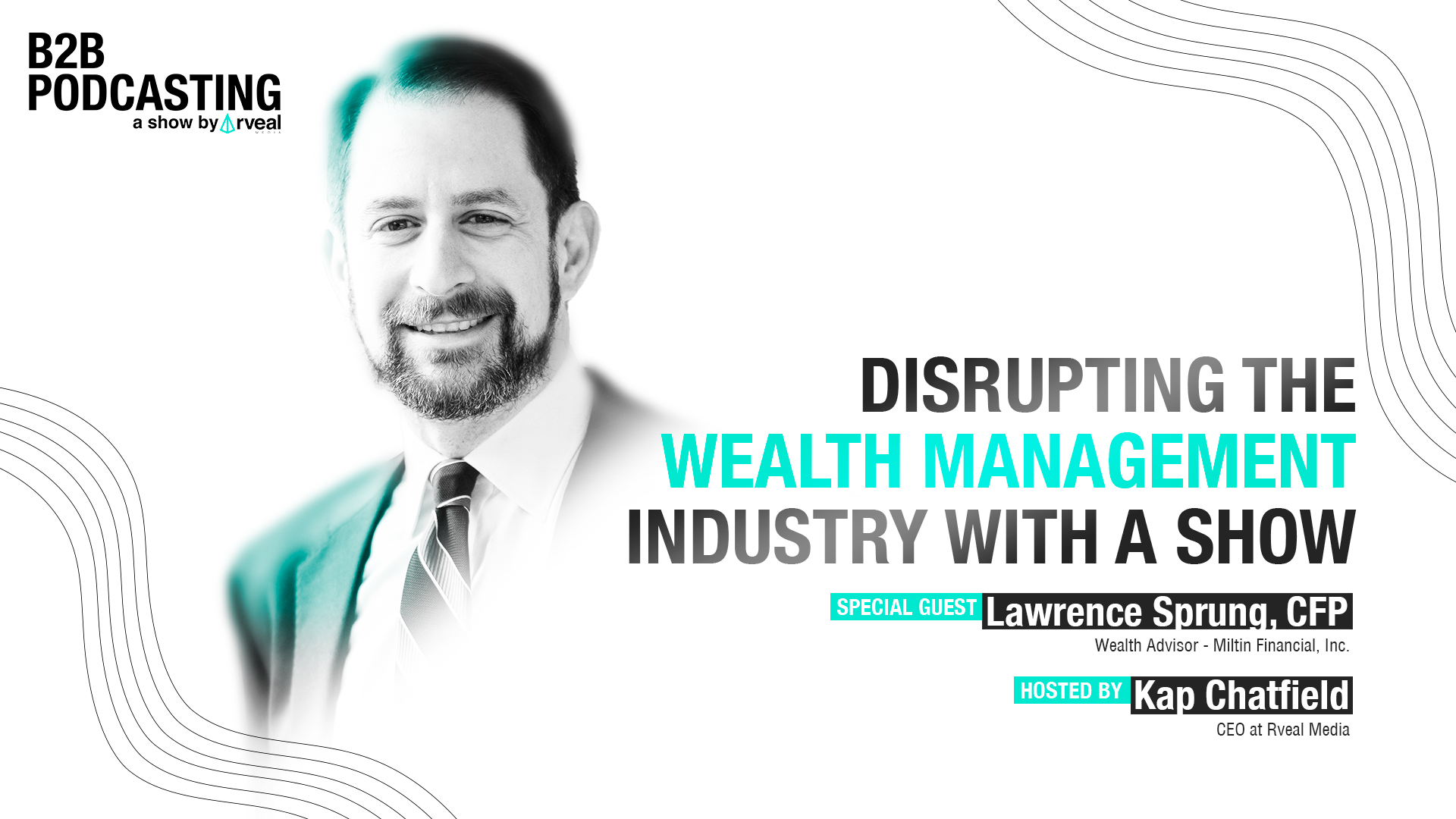
- Rveal’s website: rveal.media
- Rveal’s LinkedIn: https://www.linkedin.com/company/rvealmedia/
- Rveal’s YouTube channel: https://www.youtube.com/channel/UC69p14R2ccMdyUbbmdlWCEw
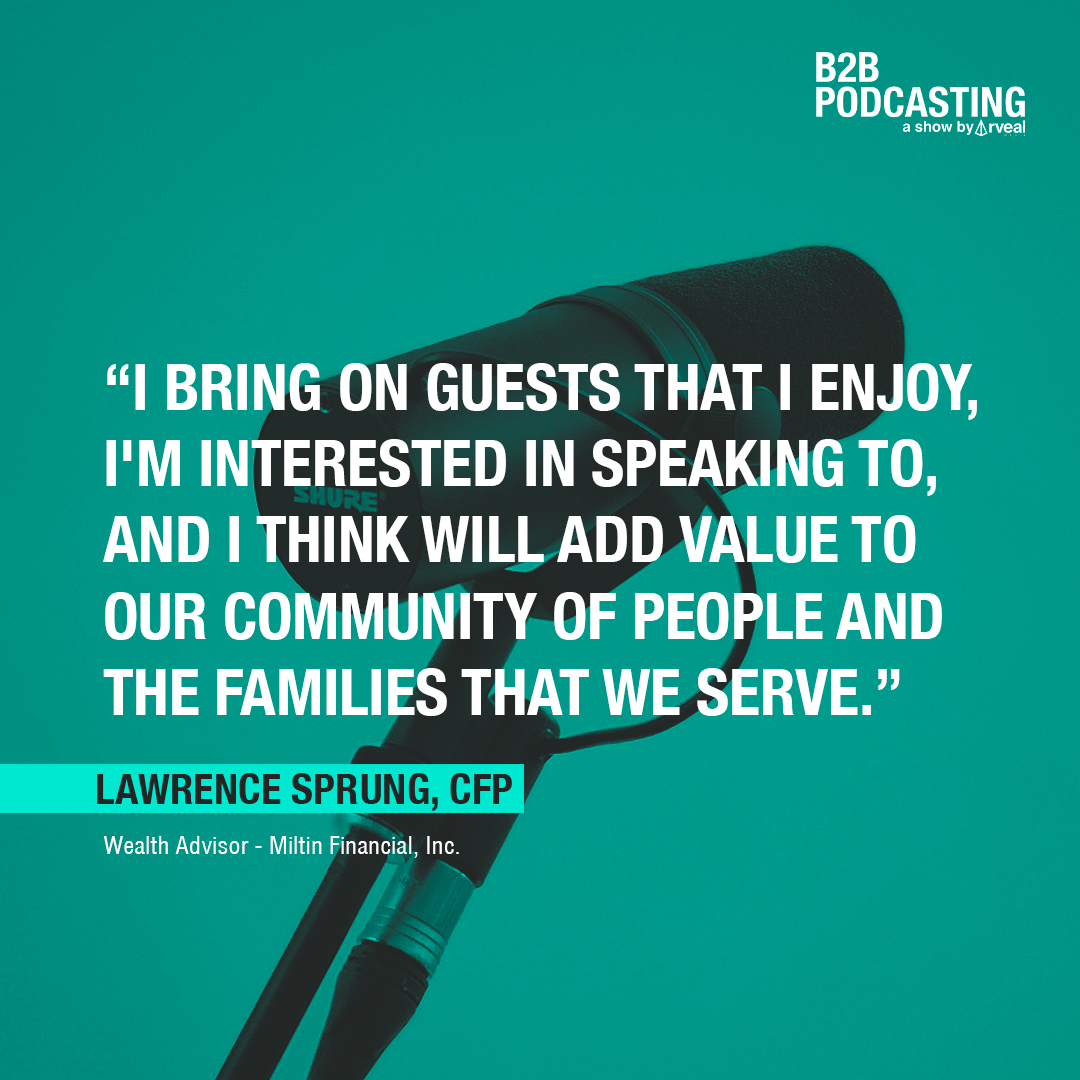
Full Transcription:
Kap Chatfield 00:20
Hey gang, welcome back to B2B Podcasting, the show that helps B2 CEOs, founders, sales leaders, and marketers skip ads and start being the show. I'm your host Kap Chatfield, CEO of Rveal Media. Today, our guest is Larry Sprung. He's a founder and wealth advisor at Mitlin Financial. And he's the host of the Mitlin Money Mindset. And today, Larry's a super special guest, he's gonna show us a little bit about his thought leadership, his background in the world of wealth management, and specifically how to build a personal brand in that world, so that you can build trust with your audience and eventually win them over and do business with them as your clients. Larry, so great to have you on the show today.
Larry Sprung 01:01
Hey, Kap, thank you so much for having me. It's a pleasure to be here. And I look forward to having an awesome conversation.
Kap Chatfield 01:07
Yeah, we're gonna have a lot of fun today. But let's let's just kick it off. I want to give a little bit of context into who you are, who Mitlin is, get to really understand your brand. And what sets you guys apart. So why don't you tell us a little bit about the background story of Mitlin Financial?
Larry Sprung 01:21
Yeah, so as a as a wealth management firm, you know, a lot of people think that our most asked question is, "hey, what investments should I make? Or am I doing the right thing?" And it's not the most asked question. And we did a whole podcast about this specific thing, because of that is, how did the name, how did you get the name Mitlin? Where did it come from? Because they know that nobody here has that last name. They know nobody is has that name. So that happens to be the most asked question. And it also gives, you know, our clients and potential clients are a lot of insight into who we are and what we're about. So we like sharing it openly. So for your listeners, Mitlin was founded by combining two names MIT, was my wife's grandfather, Mitchell, and L I N was my mother, Linda. And unfortunately, both of them passed away literally within hours of each other. Oh, and then yeah, yeah. And then a couple months later, I met my wife. So it's kind of spooky, if you think about it. And you know, some people in the family have said that somewhere out there, they they met up and brought us together. And we, we didn't realize what you know, that had happened until we met obviously, and then we started having conversations and reconciling what we had been doing over the last several months. And it came down to the fact that these two individuals literally within hours of each other passed away. And, you know, looking at their background, my my wife's grandfather was a New York City police officer, a veteran, you know, great values, great family guy. My mom was a homemaker, raised myself and my sister, unfortunately was stricken with cancer at a very young age. But she was a rock for the family. And she was a rock for the community, very well liked when she passed, the outpouring of support was huge. She instilled a lot of the values and a lot of who I am today is obviously because of her and her strength. And when we started thinking about launching this firm, you know, we thought about this story and the fact that these two individuals really embody everything that we want to be and we want to aspire to as a firm, so we thought what better way than to take them and take their names and put them together and name the firm after us? I know that a lot of wealth management firms name their firms after whoever founded the firm, but I want to build the firm that's going to last beyond my lifetime and leave a mark for not only my generation in my lifetime, but multiple generations to come.
Kap Chatfield 03:55
That's, I love it. I love the story behind that. It's definitely kind of there's, there's like an ethereal, it's really it's a meaningful story behind the name of it. And clearly you guys are doing things that are just super cutting edge. I mean, as far as legacy goes, you I think you guys are totally on your way to doing something extremely unique. That's, that really stands the test of time. And I would say just candidly, I think your show is a big part of that. So why don't you tell us a little bit about the show that you guys are doing The Mitlin Money Mindset and what got you you know, what, what made you want to start doing a show for your company's brand in the first place?
Larry Sprung 04:32
Yeah, so I you know, Kap, by I like probably a lot of people I delved into a lot of different areas, I over the years. I tried writing blogs, which I still do. I used to film very short videos, which I still do. And then I always had speaking engagements and quite frankly, the thing that resonated with me the most was speaking because writing is something I do I don't love. Taking videos is something I do but not necessarily love doing but I enjoy it wholeheartedly. But the easiest way for me to get things out to the masses was really speaking and, and having a podcast. And really what I always look at in podcasts is I'm always looking for interesting people that I can spend time with that I ordinarily wouldn't necessarily be able to get in the room with, and hear them give me nuggets, actionable nuggets, either about life, you know, their life, about mindset, about business, entrepreneurship. So essentially what I did was I created this collection of guests, created the Mitlin Money Mindset. We talk about mindset, our last question for every guest is, "what did you do today that brought you joy, and put you in the right mindset for success?" I think it's very important to think in those terms. So I bring on guests that I enjoy, and I'm interested in speaking to, and I think will add value to those that follow us and our community of people and the families that we serve. So those guests could be entrepreneurs. I've had professional athletes on, ex-professional athletes, sports team, owners, you know, entrepreneurs. We just released a show today with a gentleman who was an attorney and an IT person basically pushed that aside and became a professional podcaster and started his own show and brand around Disney, and has created a huge following. So just interesting people that we could all learn from. And that's really how the Genesis came about.
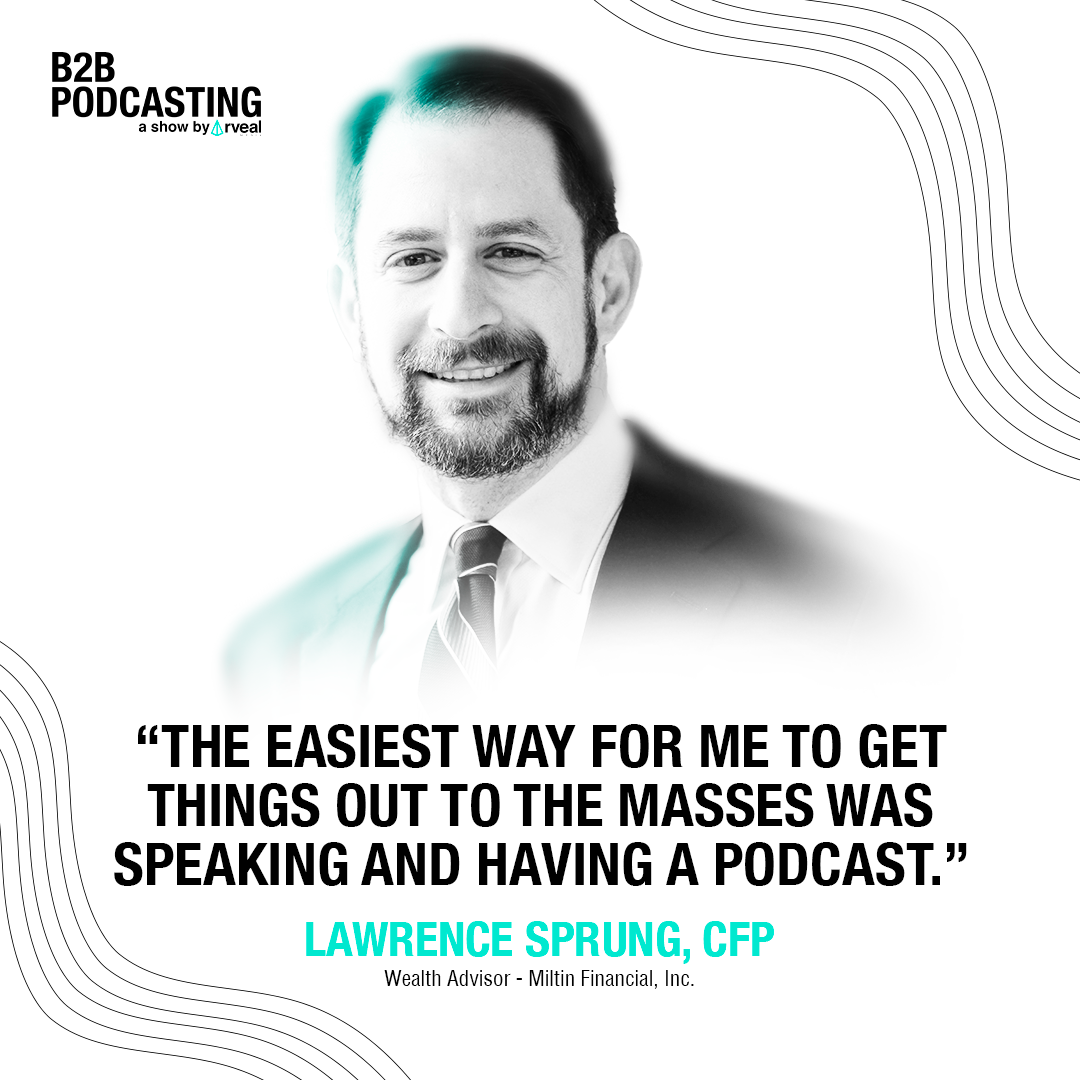
Kap Chatfield 06:38
I love it, I'm kind of in the same boat as you. I kind of gave myself this self-appointed term of serial content creator, because I'm always just testing out new things, whether it's written posts on LinkedIn, little short videos from my phone, highly more highly produced videos, speaking, all that stuff. And I personally felt like speaking has been the most natural way for me to just kind of share what I think and to kind of mine the gold out of other people and allow them to share something valuable, valuable with the audience. It's just the art of conversation. And that's like the simplest, most basic form of human communication. And podcasting is such a great platform to do that. And so it sounds like that's, you and I kind of have a similar thing going on there. I'm curious, because the brand around the Mitlin Money Mindset is so clear that you're creating a show really about not just wealth management strategy, not just, you know, tips and tactics, and here's some new trends or here's new tax law, or, or whatever, you have a clear focus on mindset. And you're bringing on featured guests who are not just from the wealth management sphere, but you said professional athletes, entrepreneurs, people that embody what it means to have a winning mindset. Why did you feel like creating a show around mindset was so critical for your brand? You've literally attached your brand, your company's name, Mitlin to this concept of mindset. Why did you feel like that was a winning strategy for you guys?
Larry Sprung 08:07
Well, I mean, listen, I'm very transparent. So I'm going to be very blunt here. The wealth management stuff is boring for most people, you know? Most people don't want to listen to it. Most people, you know, they're inundated. You know, if they want money, ideas, or tax law updates, there's a million places they could go for that. And I didn't want to just be a nother voice in the red ocean, I wanted to go to the blue ocean. And I think I think where the blue ocean is, is, you know, people are always interested in coming back to, you know, hey, that's an interesting guest, I'm curious to hear what they want to say or how they dealt with it, you know? Hearing how a professional athlete transitions from being a professional athlete, to being an entrepreneur in business in general, is interesting, because we're all going to hit an inflection point at some time in our in our life, whether it be transitioning jobs or a transition in life. So it's interesting to see how other people, even people, perhaps we look up to, how they've handled it and get around that. And I think a lot of the things and the decisions we as a people make around money has very much to do with mindset. So our our feeling is if we can increase awareness, increase mindset, and promote a healthy mindset that helps promote making healthy decisions, even if it's through, you know, having a conversation with an NHL player, or an entrepreneur or somebody who's not directly related to to wealth management.
Kap Chatfield 09:40
Super interesting. I don't see a lot of wealth management firms really doing that. In fact, I think in the professional services realm, there's still one thing I've noticed is that you know, you have lawyers and you have accountants and wealth advisors and all these professional services, when they decide to go out and build their own thing, they tend to just think about the craft of what they do, and the brand around that expertise. And they don't think about it necessarily, like truly from a business or an entrepreneurial standpoint. And what you guys are doing is you're really doing both because clearly, you guys wouldn't have a business if you weren't experts at what you did. But what you're thinking through is "how do we how do we create a true business of true brand, that that the common person can attach themselves to?" I feel like that's really rare in your industry. And I'd love for you to speak into that. Because in the wealth advisory industry, trust is critical. I was just telling you on the pre show call, I get hit up by, you know, people all the time, whether they're total strangers, or even if they're friends who've decided, "hey, I'm going to go down the wealth advisory route, do you need any help? You need insurance?" That, I get hit up all the time for that stuff. And I feel like what the real, the thing that makes it easier to you know, switch an account over to a new advisor is going to be that trust factor, but it all comes down trust comes down to personal brand. So what do you think? I'm interested to hear just your your take on what's happening in wealth management, wealth advisory in general. And how and how there needs to be a shift regarding this personal brand element.
Larry Sprung 11:19
Yeah, so I think that and then there's a lot to unpack there, but I'll try to hit all the the questions that were embedded in there. And if I don't just fire back at me, but, you know, in terms of the industry, in general, I think it's a function of if you look at the demographics of the industry, the industry as a whole skews significantly older than I am. I'm probably in the middle of, you know, the age range of where advisors are and where they're coming into the business. And, you know, in terms of wealth management, we're very top heavy on the older generation. I think, I think the numbers are somewhere in the neighborhood of like 40, or 50% of all advisors are going to be retiring in the next 15 to 20 years. That's a big number, that means a lot of people are going to have to find new advisors. So I think the function of those advisors being skewed older, really, you know, eliminates and reduces them from looking at this medium either because they're unaware of it, they don't want to delve their toe in it. They've done the same thing for so long, and it's working okay, so they just don't want to delve into it. But, you know, I think it's a medium that is growing exponentially. I don't think it's even something that we you know, I think it's in its infancy. I think it has a lot of you know, headwind from here, to to push the you know, the medium further. And, you know, as far as building the brand, and why we feel it's so important is, you know, it's not like years ago, where, you know, if somebody referred somebody to you, they came into your office to a meeting and that was your first interaction, right? There, you had to make sure that the experience, and you still want to do this, but the experience from them getting to the office, getting in the office, into the office, it you know, that whole experience is top notch, and what what they should be because that's your first impression. Now, that's not the case. The first impressions happening, in some cases, maybe weeks, months, maybe even years before they step into your office, because everybody's googling you, googling the firm, having conversations about you and and a lot of that research can be done in advance. So if you have a library through a podcast, a library of guests, topics, things are important, influencers, influential people in the community, giving advice and guidance, and you're showing that you're not just looking to call and sell a financial product, which I think is crazy, and we never do, you know, you you're showing them, then you're building that relationship kind of organically before they even walk through the door. So the hope is when they walk in through the door, that first impression is done. And for the most part in their mind they already know whether or not they're planning to do business with you, it's just up to whether or not it's actually a really good fit when they come into the office because all of that groundwork has already been laid.
Kap Chatfield 14:24
It's essentially like passive relationship. That's something that we say as, as a company, it's kind of like you know, in the wealth management or advising world, I'm sure you have clients all the time that are asking, "Hey, how can I make some residual income? How can I how can I grow my my portfolio and my net worth over time with compound interest in creating content like you're doing?" It's essentially the same thing but it's residual impact. It's residual relationship. It's residual brand brand building, because to your point, people are doing research about you and your company before they ever stepped into the front door. I think that's, that's super smart. But I also have this thought that there's gonna be, maybe not just in the wealth management world, but professional services in general, and just b2b brands, I feel like, there's, you know, I've heard people say, b2b doesn't stand for boring to boring, it's, it stands for business to business. But for whatever reason, we have this very kind of stock photo, cold, corporate mindset coming back to mindset, when it comes to communicating value in the b2b space. But, um, but that's not as effective, I would imagine that there's more,
Larry Sprung 15:39
There's somebody else on the other end of your medium, right? Whatever that medium is like a stock photo. It's not like there's this inanimate object, that's a business that's making a decision to do business with you. There's a person behind that business that's ultimately making the decision to do business with you. So you have to try to connect with them. Whether it's directly, you know, over the phone, having a conversation, or well before that by having warm, inviting either content or photos or, you know, some kind of avenue to give them an insight about who you are as a person representing that company. Because essentially, on the other side, you are the company. And you know, this, you know, this medium is a great way to do that. And not to mention, like you say, all this content, it's just not out there in the sphere, right? If you have a conversation with a client or prospective client, it's a great tool. Like the other day somebody had asked me, this was a blog, but somebody asked me a question about a Roth IRA. Rather than even having to get on the phone with them, not that I'm adverse to that. But very easily, I went grabbed a blog article that I had written, I think, a year or two ago, copied, pasted into an email said, I think this answers your question, and probably gives you even some more information. If we need to discuss it, let me know. So you know, and you could do that same thing with a podcast, right? You know, like, I'm very involved, we were talking in the hockey community. So when I had the owners of the one of the owners of the Seattle Kraken and the owner of the New York Islanders, I ended up blasting that out to all my hockey community folks that I know because they I know, they would find it interesting, and it would add value to them. So it just builds that community.
Kap Chatfield 17:26
I love that. I love too, I mean, you've mentioned like you sent a blog to, you could send a blog about what a Roth IRA is to a current client, you could also kind of do the same with a podcast episode. But there's a reason why you're you're doubling down on the show model, the show marketing mode is what we call it. My question to you is, why do you feel like podcasting, or creating some sort of show, connects with people, or specifically decision makers in business so well as a medium?
Larry Sprung 17:55
Well, I mean, I think it shows people who you are as a person, right? You're in various number of different environments, right? It's not a very, it's not a structured environment, where you're just spewing information or tax code, which anybody could take tax code, put it in front of them and read it into a microphone. You're having a dialogue with another human being on the other side. And they could see how you treat them, how you speak to them, how you speak about them, their brand, their company, how you speak about your company, and your stakeholders, and the people that work for you. And it gives them a sense of what you're about as a person and as a brand as a company. And there aren't really very many ways to do that, you know? You used to have to run an ad somewhere, which you know, what's an ad going to tell you? You try to evoke that emotion through a picture or through words in a traditional print ad, right? But here, you have the emotion, you can hear it in the in the person's voice or the guests voice, and it gives you an opportunity. And it also, you know, adds a lot of credibility. If you're on the phone with certain people or on the podcast, I should say, you're bringing on a certain level of guests, it also raises your level of credibility saying wow, he, you know, he has some really unique people on here, you know, he's got an NFL players, NHL, you know, how is he involved in this community? I want to know more and see what, you know, it's really that education component and, and putting you as that, you know, that expert.
Kap Chatfield 19:25
So what about ROI? Because I could imagine, you know, B2B, especially in your industry, because your industry, it's like, it's all about, "Hey, how was how can we grow? How can we how can we grow our revenue? How can we grow our net worth?" And so I'm even imagining the B2B business leader who's like, "but what's is there truly an ROI to podcasting?" What, why don't you share a little bit about your experience with your show? How is it attributed to the growth in your of your business in any sort of quantitative or qualitative way?
Larry Sprung 19:56
Yeah, so I think a lot of people and it may, maybe I'm mistaken, and maybe the folks listening to this don't don't quan, you know, quantify things this way. But I think a lot of people get hung up on the downloads. "Oh, you know, I gotta have these downloads, I gotta have, you know, 1000s of them". And I don't believe that to be the case. I would rather have less downloads and have more engaged listeners, have a listenership that's coming back every show to listen. They're engaging, potentially downloading some of our resources, reaching out for guest ideas or questions, things of that nature than a very broad audience. But with that said, and I think you also have a better opportunity for that ROI if you have a, a more streamlined audience that is a engaged community. So you know, the way it's tough to really build or understand the ROI in terms of, you know, what does it exactly equate to? Because, you know, in certain instances, somebody may reach out to us to become a client. And the podcast may only be one of many touches that brought them to that place. They may have looked us on social media, they may have looked at our website, and maybe the podcast was also listened to. Maybe they listened to all the shows, and that might have brought them over the edge, it may not have been the deciding factor. But I can tell you that it's probably in the decision. But I will tell you, for example, we have in the last, our shows been about it, we launched it October of 2020. So as I'm speaking to you today, it's about a year old. And we've gotten two specific clients that fit our ideal client profile directly from podcasting. One came directly from our show, that was actually a guest that after we had the interview, he asked if we could stop recording, and if he could ask me a few questions, and if I could help him out. And that resulted in a relationship that we started as a result of having them on the show. And then the second one was, because you're now a podcaster, you now get requests from other people to come on their show, right. And I could talk about a lot of topics, I try to stay away from the financial stuff, because like I said, you know, people get bombarded with that. So we're as a family, we're a big Disney family, my wife and I went with our kids, went on a South African safari a couple years ago through Adventures by Disney. And we put it out there because a lot of Disney podcasters, and shows have never had anybody on their show that has been on that trip. So I get asked frequently to come on and talk about that adventure that we took. And as a result of me having my show got invited on a podcast for Disney dads. And for as a result of that, we got an inquiry from somebody who's ultimately become a client as well. So you know, and that's only in the first year. And that really is all we need to really cover our expenses, time to put the show together. So the ROI is tremendous. And that doesn't mean you know, that doesn't even include the countless others that have become clients over the last year that I know, and I'm sure that the podcast was an integral component of their decision making process to come in and meet with us, ultimately.
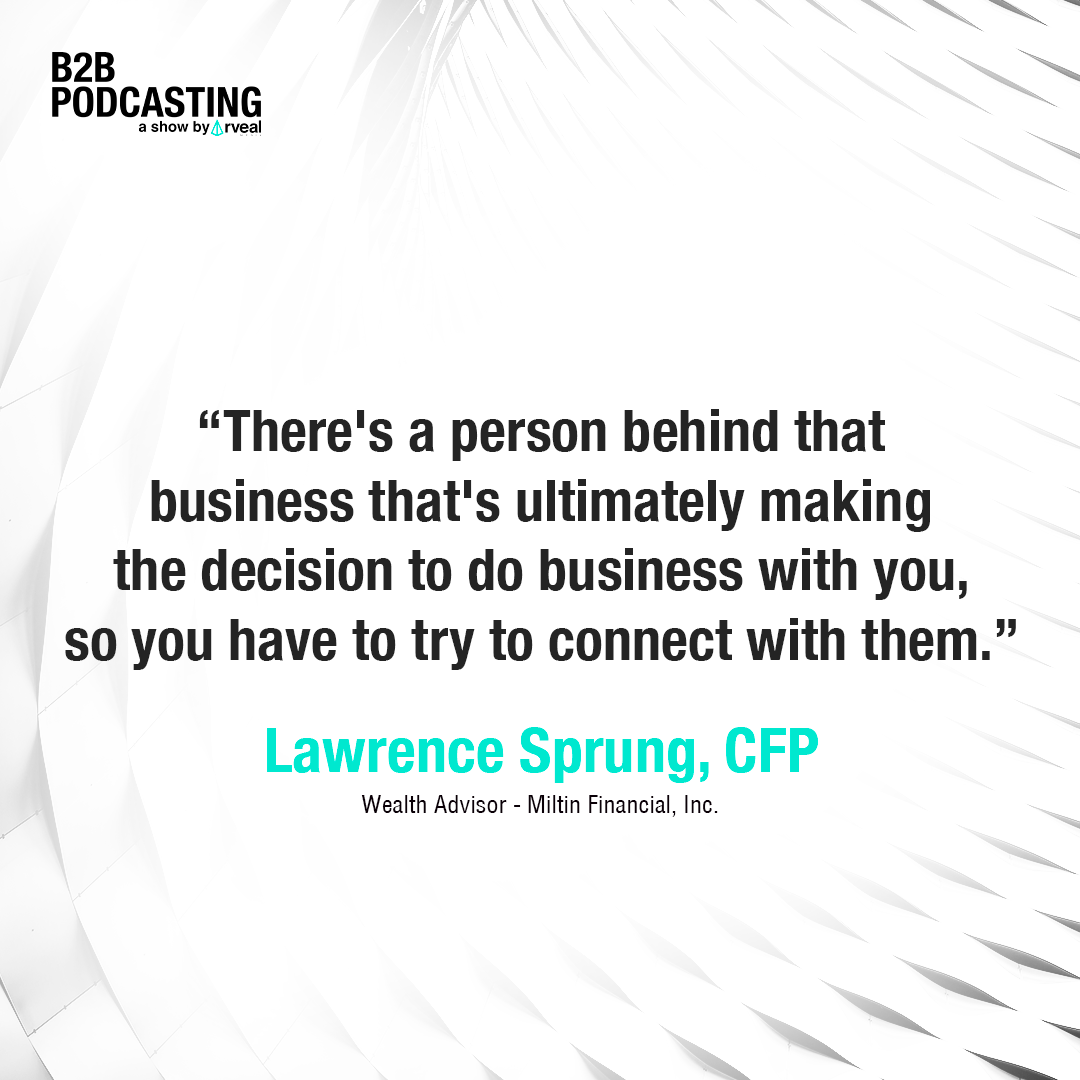
Kap Chatfield 23:25
I'm sure there's also a retention element too that the podcast provides where they, you know, they become a client, and then the podcast becomes a way for them to continue to grow. I mean, and the fact that it's very mindset oriented, it doesn't really necessarily matter where you are in your wealth management, you know, where you are in that spectrum of whether you're just getting started or whether you've been you know, stewarding those finances for decades. The mindset element, it's, it could be valuable to anybody at really any point. So I think that's, that's probably another element that's, that's cool, too. It'd be, it'd be interesting for you guys to try to track that with your current clients. I want to I want to pivot to, because you mentioned that you had your started your show towards the end of last year 2020. And we all know, 2020 was a you know, there's a very earth shifting year with regards to COVID. Everyone was kind of thrust into this world of working remotely, a lot of companies are still working remotely. And what's interesting is what you said is I've seen very, it's very common with a lot of the people that we've had on this show, they actually started doing their podcasts or their show in the year 2020 after COVID hit. And I think as you know, there's a lot of reasons why, they're trying to build rapport with their ICP, trying to figure out how to do that digitally, recognizing man, the workplace is just shifting. People are now actually almost expecting you to show up on their screen and communicate to them that way. But there's still, I'm sure there's still some hesitancy for some b2b brand leaders. So my question to you is, how should b2b brand leaders start embracing digital relationships, particularly through perhaps a podcast or content creation online? Considering us being in a post COVID environment?
Larry Sprung 25:15
Yeah, I think it's a, it's a must have. I mean, I think you have to have some kind of strategy along those lines. Unfortunately, I can't tell you that I was that smart that I launched it in the middle of the pandemic, but I did, but I was starting to plan it before everything hit, you know, and, and I was starting to get things going. And then it took a little while longer than I expected to get the right equipment and get everything recorded, etc, because we were working on it. And, you know, we had to pivot a little bit, because initially, I was expecting to do a lot of in person recordings of the show, and we pivoted to a lot of electronic versions, like we're doing today remotely. So I think it's vital for b2b businesses to, you know, get into this digital environment that we're in, because my, my feeling is that it's, it's not going to go away, it's not going to change that much. You know? I think if anything, after the last couple years, I think businesses are starting to realize that, you know, they don't necessarily have to put somebody on a plane for every single trip, you know? There are certain key situations where somebody still has to get on a plane, go to the other business meetup, shake hands, you know, do the formalities there. But at the same time, a lot can be done without having to make that flight. And, you know, the digital platform, you know, for meetings, obviously, has taken off, and I think podcasting just adds additional value there. I mean, if I'm a b2b company, I would probably start my podcast by having some of my top clients on my show. And it really would give other businesses a sense of who you work with, why you work with them. And then if they're similar in nature, they're gonna say, "Hey, why am I not working with them?" So I think it's a great platform for them to utilize. And if they're not on board now, I think eventually, they will have to be, but you're better off being in the earlier stages than, than the later stages, because I think this medium is just gonna grow exponentially as time goes on.
Kap Chatfield 27:28
I couldn't agree more. Let's, let's give some final advice, as we kind of close up this episode, to that person who's thinking, "You know what? Larry, I want to be just like you and I grew up, I want to do my own show, I want to I want to leverage it to build some very strategic relationships. I want to use it to build a personal brand and build trust with my ICP. Where do I get started?" And let's avoid, you know, some of like the technical stuff of like equipment, because my philosophy personally is, because of what happened with COVID, I feel like the production bar has brought been brought down very low, it's very easy to just get in the game, get a USB microphone, get a USB, you know, webcam, if you want or a light. I know even before the show started, you were like, "Hey, let me make sure I get my lighting on". So lighting is good. All that's important. But I'm thinking more about strategy, maybe even mindset, what's what's like the first thing that a b2b leader should consider as they start this endeavor of creating a show?
Larry Sprung 28:27
It's it's no, Kap, that's a great question. I don't think it's any different than when you set out to start a business, or got into the business. I think the very first thing is you have to think about "what's my why?" Why am I doing this? Why am I going to invest time? Why am I going to invest money? And why am I going to invest energy into this endeavor? And I think you have to create that "why" and then start figuring out, you know, based upon that "why", what's the message that you want to deliver? What's the type of guest? What's the type of show? And then start writing down some of your top clients or customers that may fit that profile, that you know would be willing and able to come on the show. And really just start recording, just start doing it. I mean, you know, like you said, the barrier to entry is somewhat lower. And at the same time, it's not like, you know, years ago where if you were going to start this new marketing initiative, that you had to hire a team to start putting this thing together, you had to invest a large amount of money, you had to track the results and hope hope that it was gonna work out and drive more business. It's a lot easier now to be more flexible. If a show doesn't fit your criteria six months from now, you can the show if you had to. You could tweak the intro, you can tweak the outro, you can change things in editing. So, you know, anything could be tweaked depending upon, you know, what you're seeing is working or not working. You can invite different guests on. So it has to be also, you know, an ever an evolutionary process, you can't just go into it, create your why, get your guests, start recording and and just keep doing it that way. You have to listen to the shows, you have to see where you can improve, where you might be great already and and accentuate that more, and continue to refine that process. And then you also want to see, you know, are you getting direct business from it? Number one, because that's the easiest way to track it. And then one of the other things is, you know, ask people when they start doing business, did you know about or listen to any of our podcasts or shows before you decided to work with us? Or we work together? And if so, you know, what was what what was the best show that really resonated with you? And you'll, you'll start getting idea that you'll see some commonalities there as far as what's working, what's not, and, you know, continue to double down on the things that are working and get rid of the things that aren't working really fast.
Kap Chatfield 31:04
So good. That's so good. Larry, I want to actually just finish as a as we close out this episode, just so everybody knows, I'm putting the your LinkedIn profile in the show notes and in the description so people can follow you directly. We also put the link for your show the Mitlin Money Mindset as well as Mitlin Financial if anyone wants to get connected with you there. But I'd love to give you an opportunity just to shout out anybody, doesn't have to be in your space. But perhaps there's a show that you've been consuming recently that you've been like, "Man, this is, this is just a really a great show. And I'd recommend it to other people". What show would that be if you have one?
Larry Sprung 31:39
Yeah. So I listen quite frank frequently to the EOS podcast, Entrepreneurs Operating System. Gino Wickman, is the founder of EOS. And I love their shows, because they have, you know, a vast variety of entrepreneurs on there. All different businesses. It always amazes me how people started a business, got into a business and some of the crazy things that are such successful businesses. And I love hearing how they tick and and what they're doing to manage their business, you know, the way they are. And I find it, you know, extremely, you know, helpful and thoughtful and a lot of great takeaways.
Kap Chatfield 32:21
Love it. Yeah, I'm a huge fan of Gino Wickman, I love the book Traction, we've actually, you know, kind of structured our whole business and our meeting strategy around the whole EOS operating system. So,
Larry Sprung 32:31
Same here.
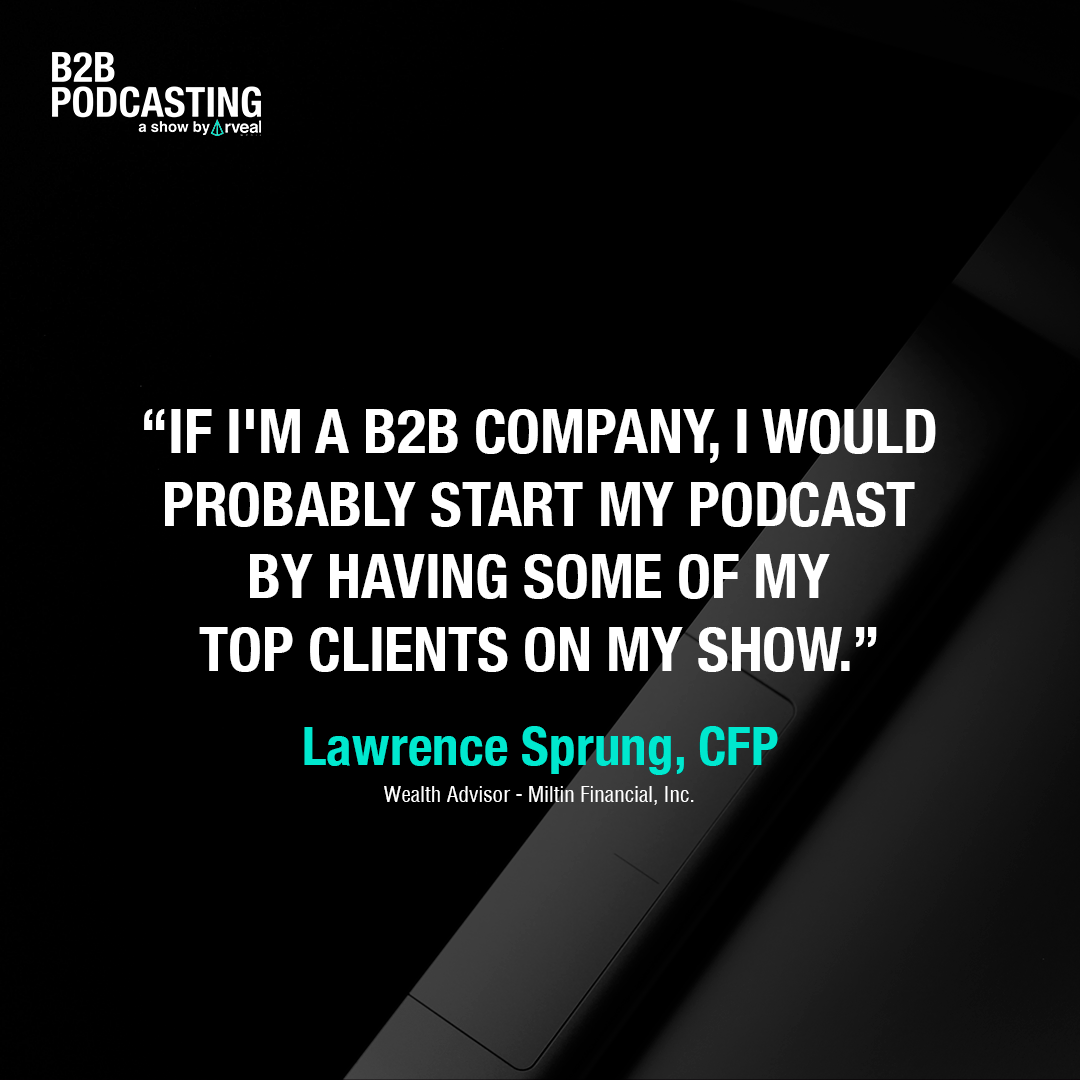
Kap Chatfield 32:32
I love it. Yeah, it's great. You guys gotta check that out for sure. If you haven't checked out their book, Traction, I'd totally recommend it. But we got to also continue to plug you and your show because you guys are doing something really special as well. So again, the link to the Mitlin Money Mindset is going to be in the show notes and description this video. Follow Larry on LinkedIn, you can also check out his the website for his his firm, Mitlin Financial. Larry, I'm just so grateful to have you on the show today. You answered those questions so well. Clearly you guys are doing such a good job. I love that there's an ROI that you're already tracking with your your show and I wish you the best moving forward. Thanks so much for joining us.
Larry Sprung 33:09
Hey, thanks Kap. It's been a pleasure. And thank you for having me and it's been a great pleasure speaking with you and your audience.

